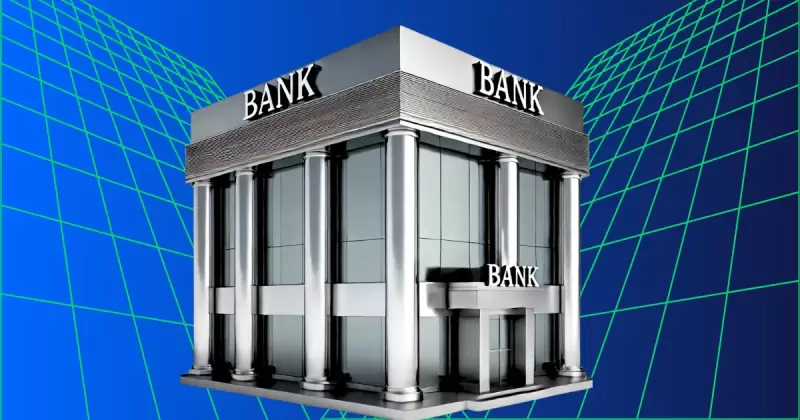 |
|
 |
|
 |
|
 |
|
 |
|
 |
|
 |
|
 |
|
 |
|
 |
|
 |
|
 |
|
 |
|
 |
|
 |
|
Cryptocurrency News Articles
Non-Custodial Banking: The Future of Finance Is Now
Feb 22, 2025 at 11:20 pm
Imagine waking up one day to discover that your bank has frozen your account. No explanations, no apologies, and no warnings. You can’t access your own money.

Imagine waking up one day to discover that your bank has frozen your account without explanation, apology, or warning. You can’t access your own money. Think this is unrealistic? Think again. This is exactly what happened to thousands of Silicon Valley Bank customers last year when the bank collapsed overnight. It was a shocking and gut-wrenching reminder of the risks of custodial banking and centralized finance.
Custodial banking is the type of banking that we all know – places that hold and manage your money. The moment you deposit funds, you don’t just give them your currency, you give them control, and with that, they have the power to restrict your access, block transactions, and in some cases, lose your funds due to institutional mismanagement.
You deserve a better system.
The Risks of Custodial Banking
Where to start. The banks can arbitrarily do almost anything they like, such as freezing your account, causing you anything from a minor inconvenience to severe financial distress. There have been instances where a husband has died and the bank has frozen his joint-access accounts, locking his bereaved wife out at an excruciating time.
On top of that, custodial banks own all of your private financial data, which they routinely lose. Now, of course, accidents happen, but banks and their outdated security infrastructure have become perfect targets for cybercriminals and career hackers, who know that this compromised data is worth a small fortune.
It’s not only banks’ data security practices that are weak, so are their antiquated policies, which see them prioritize excessive profits over customers’ best interests. This translates into exorbitant overdraft, loan, and mortgage fees, or poor interest rates on customer savings (while the bankers’ bonuses keep growing). At the same time, a lack of banking transparency means that your funds could be used for risky investments or speculative trading without your knowledge or consent. That is exactly what Silicon Valley Bank did to cripple themselves and lose $1.8bn of customer funds that were entrusted to them.
We only have to go back a little further, to the 2008 financial crisis, a terrifying case study that allows us to point our fingers directly at the banks and identify how their reckless behavior led to devastating consequences for the whole world. Millions of people suffered directly, with many entrusting their life savings with bankers who were more competent at financial mismanagement and fraud than doing their actual jobs. Everyone else suffered through recessions, stagnant wage growth, high debts and unemployment, home foreclosures, an increased cost of living, and more.
In 2023, it was found that bankers’ bonuses have more than doubled since 2008. They’re no longer working for us at all.
What Is Non-Custodial Banking and Why Is It the Solution?
Non-custodial banking means taking full control of your own funds without any reliance on third-party institutions, like banks and building societies. Once upon a time, this meant stuffing cash under the mattress, but these days, we’re talking about decentralized finance (DeFi) and blockchain technology.
You hold your money in a way that nobody else can touch it. You hold the keys, and only you. With non-custodial banking, the combination of digital wallets, private keys, and smart contracts provide you with complete ownership and control of your assets. No more arbitrary freezes. No more data theft. No more restrictions. In addition, you have enhanced privacy and security, thanks to advanced cryptographic encryption and distributed ledger technology.
Beyond improved security and control over your funds, there are other, less obvious advantages to non-custodial banking. One is that you’re no longer exposed to the same dangers of data loss, damage, or access complications as regular banking customers. Natural disasters, fires, and extreme weather have all led to major data loss over the years, not just for paper records, but for digital data too – not to mention service outages.
The Rise of Deobanks: A Self-Sovereign Alternative
A new generation of financial technologies is now disrupting the traditional banking industry, with WeFi leading the charge. As the first “Deobank”, WeFi represents a novel class of decentralized on-chain banks that are built on blockchain rails. Unlike traditional banks, and even Neobanks (which are still 100% custodial), Deobanks like WeFi provide decentralized and transparent financial services to their users, while still empowering them to retain full control of their non-custodial accounts.
It’s the best of both worlds, as WeFi offers non-custodial banking services with additional features, made possible by their smart contract-based accounts. WeFi’s account holders can spend using digital cards and smart wallet transactions, without ever handing over control of their funds to an intermediary. The transparent nature of the blockchain ensures full accountability without compromising user privacy.
Everyone can benefit from non-custodial banking using services like WeFi, but one of the earliest case studies and beneficiaries of technology of
Disclaimer:info@kdj.com
The information provided is not trading advice. kdj.com does not assume any responsibility for any investments made based on the information provided in this article. Cryptocurrencies are highly volatile and it is highly recommended that you invest with caution after thorough research!
If you believe that the content used on this website infringes your copyright, please contact us immediately (info@kdj.com) and we will delete it promptly.
-

-

-

- THE OFFICIAL MAGACOIN Price Predictions 2025: Will MAGA Dominate the Next Bull Run?
- Feb 23, 2025 at 12:40 pm
- The cryptocurrency market is heating up in 2025, with established giants like Ethereum (ETH) and Binance Coin (BNB) facing fierce competition from breakout tokens like THE OFFICIAL MAGACOIN. While ETH and BNB are projected to deliver steady growth, analysts are buzzing about MAGACOIN's potential to outperform even the most bullish predictions. Let's break down the forecasts and explore why this political movement-backed token could dominate the 2025 bull run.
-

-

-

- Cardano (ADA) Market Experiences Notable Fluctuations Amidst Anticipation for Potential Exchange-Traded Fund (ETF) Approval
- Feb 23, 2025 at 12:30 pm
- The cryptocurrency market is experiencing notable fluctuations, particularly with attention focused on Cardano (ADA) as its potential approval for the first exchange-traded fund (ETF) captures investor interest.
-

-

- Solana (SOL) Grapples with Price Drop, Falling Network Activity, and Upcoming Token Unlocks
- Feb 23, 2025 at 12:30 pm
- Solana (SOL) has been grappling with significant challenges in recent weeks, from a steep drop in its token price to falling network activity. As the ecosystem braces for upcoming token unlocks, many are left wondering if further declines are on the horizon for one of the most talked-about cryptocurrencies.
-

- Arctic Pablo Coin Shines Among the Best New Meme Coins to Join This Week
- Feb 23, 2025 at 12:30 pm
- Meme coins have taken the crypto world by storm, evolving from internet jokes to high-performing digital assets. Investors who once overlooked these quirky tokens are now witnessing their meteoric rise, with some coins delivering staggering returns. As the meme coin craze intensifies, three standouts are capturing significant attention—Arctic Pablo Coin, Mog Coin, and Neiro Coin. Each brings something unique to the table, but Arctic Pablo Coin is emerging as an exceptional opportunity with its lucrative presale and innovative features.






















































